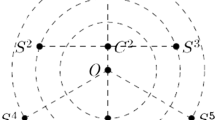Abstract
Goebel et al. [4] presented a unified decomposition of ensemble loss for explaining ensemble performance. They considered democratic voting schemes with uniform weights, where the various base classifiers each can vote for a single class once only. In this article, we generalize their decomposition to cover weighted, probabilistic voting schemes and non-uniform (progressive) voting schemes. Empirical results suggest that democratic voting schemes can be outperformed by probabilistic and progressive voting schemes. This makes the generalization worth exploring and we show how to use the generalization to analyze ensemble loss.
Preview
Unable to display preview. Download preview PDF.
Similar content being viewed by others
References
Bauer, E., Kohavi, R.: An empirical comparison of voting classification algorithms: bagging boosting and variants. Machine learning 36(1-2), 105–139 (1999)
Bouckaert, R., Goebel, M., Riddle, P.: Generalized Unified Decomposition of Ensemble Loss (full version of this paper), available from http://www.cs.waikato.ac.nz/~remco/gudelfull.ps
Breiman, L.: Bagging predictors. Machine Learning 24(2), 123–140 (1996)
Goebel, M., Riddle, P., Barley, M.: A unified decomposition of ensemble loss for predicting ensemble performance. In: ICML 2002 (2002)
Singer, Y., Schapire, R.: Improved boosting algorithms using confidence-rated predictions. Machine Learning (1999)
Author information
Authors and Affiliations
Editor information
Editors and Affiliations
Rights and permissions
Copyright information
© 2006 Springer-Verlag Berlin Heidelberg
About this paper
Cite this paper
Bouckaert, R.R., Goebel, M., Riddle, P. (2006). Generalized Unified Decomposition of Ensemble Loss. In: Sattar, A., Kang, Bh. (eds) AI 2006: Advances in Artificial Intelligence. AI 2006. Lecture Notes in Computer Science(), vol 4304. Springer, Berlin, Heidelberg. https://doi.org/10.1007/11941439_136
Download citation
DOI: https://doi.org/10.1007/11941439_136
Publisher Name: Springer, Berlin, Heidelberg
Print ISBN: 978-3-540-49787-5
Online ISBN: 978-3-540-49788-2
eBook Packages: Computer ScienceComputer Science (R0)




